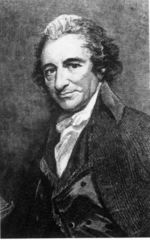Thomas Paine
Thomas Paine (January 29, 1737 - June 8, 1809) was a British journalist, writer, and revolutionary whose works were influential during the Enlightenment. He is most famous for publishing his pamphlet Common Sense during the American Revolution, a denunciation of British rule, that was said to speak to the elites as well as the common man. He went on to write several other influential works, including The Crisis, Rights of Man, The Age of Reason, and Agrarian Justice.
Early Life
Thomas Paine (born Thomas Pain) was the son of an unlikely couple - Joseph Pain, a 29 year old staymaker and Quaker and Frances Cocke, a 40 year old daughter of a prominent lawyer and an Anglican. Between the ages of 6 and 13, he was enrolled in the Thetford Grammar School where he developed an interest in science and poetry. When he turned 13, his parents decided to forgo his formal education and he became apprenticed to his father. In 1756, he left home and set out for London as a journeyman staymaker. This endeavor did not last long, however, and in 1757 he decided to join the crew of the British privateer King of Prussia for a lucrative eight month stint at sea.
Upon his return to London, Paine used his earnings to mingle with the artisan-intellectual community of the city. In doing so, he was exposed to the class resentment toward the aristocracy as well as the radical views of people such as John Locke. In 1758, his money was running out and he decided to resume his career as a staymaker and moved to Sandwich, Kent. A year later he met and married Mary Lambert, a local maid, who died shortly after during childbirth. His business collapsed shortly afterward. In 1762, Paine began a new career as an excise officer. He was dismissed in 1765 on the charges that he stamped goods which he did not actually examined. He appealed to the Excise Commission for reinstatement, which was successful in 1768. While waiting for his reinstatement to go into effect, and he spent time in Diss, Norfolk staymaking, followed by several months as an English teacher and tutor in London.
When Paine was reinstated, he was relocated to Lewes, Sussex, where he spent the next six years. Lewes was noted for having several dissenting churches and a republican political tradition, which formed a community that Paine could easily settle into. He joined the Headstrong Club, a local social club that frequently discussed politics, which gained him a reputation as a debater of great skill. He inherited a tobacco shop upon the death of his friend, Samuel Ollive, in 1769, and went on to marry his daughter, Elizabeth, in 1771. In 1772, excise officers in the Sussex area decided to petition Parliament for higher pay, and Paine was chosen by his colleagues to draft a petition, titled The Case of the Officers of Excise. He was sent to London to lobby for their cause, however, he was ultimately unsuccessful. As a result, he was fired by the Excise Commission, and his time away from Lewes caused both his tobacco shop and marriage to fail.
During his times in London, Paine had the fortune to become acquainted with Benjamin Franklin, who was the American colonial representative to England. Franklin was sympathetic to Paine's plight and suggested to him that he emigrate to the colonies. Paine agreed, and with a letter of recommendation from Franklin, set sail for America in September 1774.
Life in America
Paine arrived in Philadelphia on November 30, 1774, after an arduous journey which took him weeks to recover from. While exploring the city, he met Robert Aitken, who after some discussion offered him the job of editing The Pennsylvania Magazine, embarking him on a new career as a journalist. The magazine was very successful under under his editorship, with subscriptions more than doubling and Paine's own writing gaining notoriety.
Work in Progress
References
Kaye, Harvey J. Thomas Paine and the Promise of America (New York: Hill and Wang, 2005).
Kramnick, Isaac, "Editor's Introduction", in Common Sense (London: Penguin Classics, 1986).
